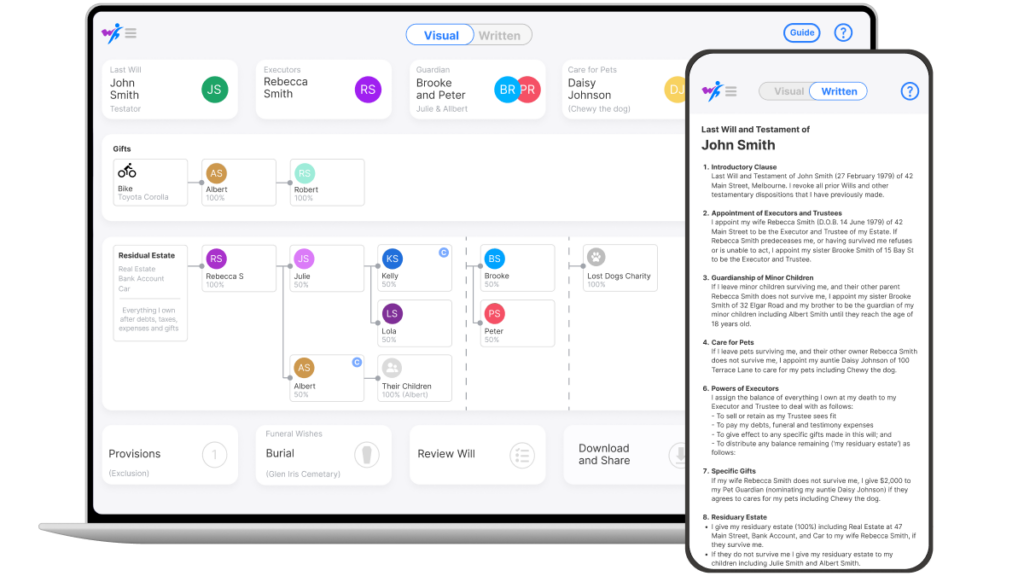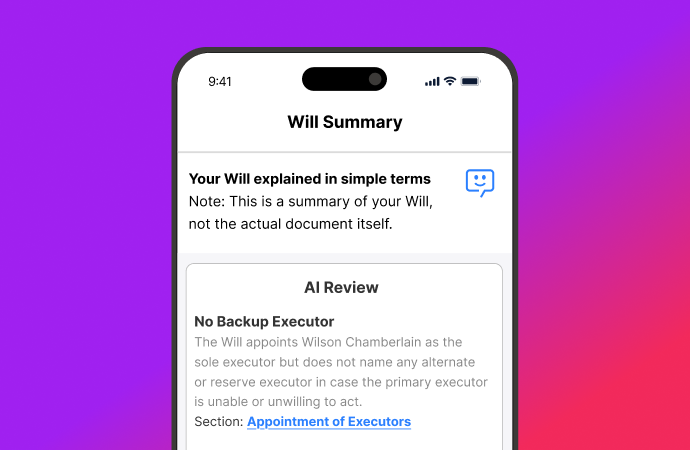
How To Make a Will in Texas
A Step-By-Step Guide for creating a Last Will and Testament In Texas
Introduction: What is a Will?
Making a Will is a vital step in directing how your assets are handled after your death. It empowers you to make significant choices about your legacy and the future of your loved ones. Beyond merely transferring property and finances, a will enables you to appoint guardians for your minor children, ensuring they are cared for according to your wishes. If you don’t have a will, the state of Texas will determine the distribution of your estate, which may not reflect your personal preferences.
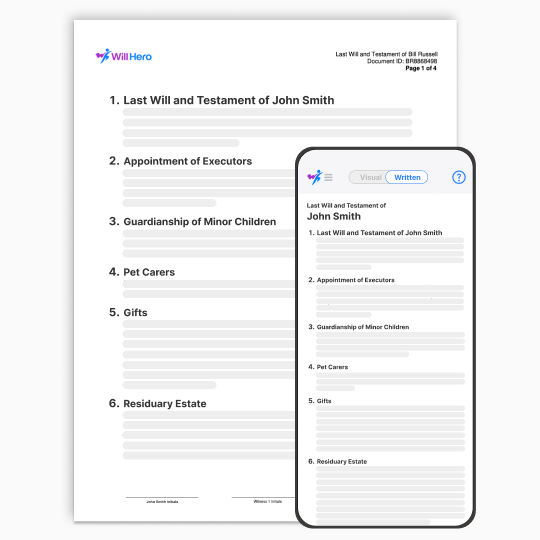
Laws for Creating a Will in Texas
When making a will in Texas, you must adhere to specific legal requirements. Failing to meet these criteria could result in your will being invalid, causing complications during probate. Below are the key legal requirements in Texas:

You must be at least 18 years old.

You must be of sound mind:
This means you understand the nature of creating a Will, what your assets are, and the identity of your beneficiaries.

The Will must be in writing:
Texas recognizes both typed (attested) Wills and handwritten (holographic) Wills. Oral Wills are not recognized in Texas. Your Will must be signed by you and two competent witnesses.
By following Texas will laws, you can ensure your estate is distributed as you intend. If your will doesn’t meet these requirements, it may be contested or deemed invalid, potentially leaving the fate of your estate to the courts.
Step-by-Step:
How to Draft Your Will in Texas
1. Choose an Executor
An executor is the person responsible for carrying out your will and managing your estate after you pass away. They ensure that your assets are distributed according to your wishes, pay any outstanding debts, and handle the legal steps required to settle your estate.
When choosing an executor for your will, it’s important to select someone who is organized and trustworthy. In Texas, you can choose an out-of-state executor, but they may be required to appoint a local agent who resides in Texas to handle legal paperwork. Ensure your executor understands the responsibilities involved and is willing to carry them out.
It’s common for people to choose a family member, close friend, or a professional advisor as their executor.
It’s wise to name a backup executor in case your first choice is unable or unwilling to serve when the time comes. Having an alternate ensures that your estate will be managed smoothly without unnecessary delays.
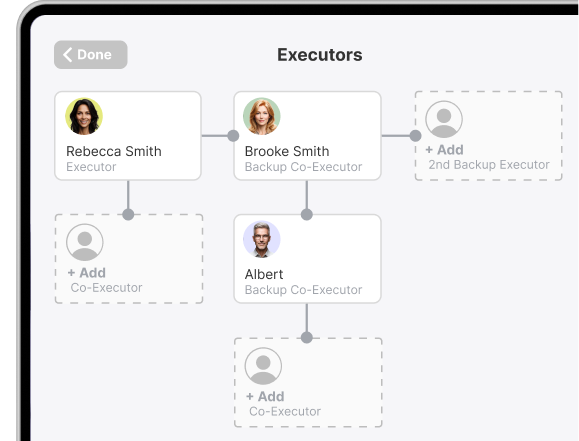
2. Name a Guardian for Minor Children
If you have minor children, or plan to, it’s crucial to name a guardian in your will to care for them in the event of your death. The guardian you choose will be responsible for their upbringing, including making decisions about their education, healthcare, and overall well-being.
While naming a guardian is optional, it’s an important consideration for parents. In Texas, if you don’t designate a guardian, the court will appoint one on your behalf, who may not be the person you would have chosen.
It’s wise to name a backup guardian in case your first choice is unable or unwilling to serve.
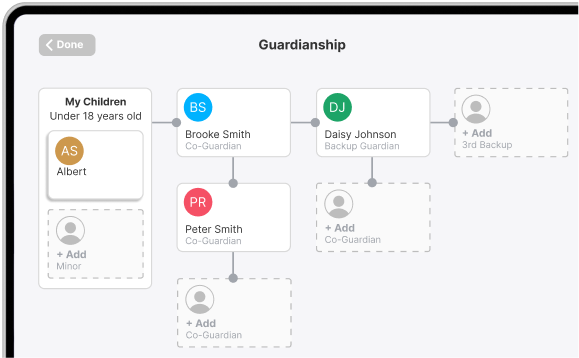
3. Name a Pet Carer
Texas law allows you the option to include provisions for the care of your pets in your will. You can name someone to care for your pets and allocate resources for their upkeep. This ensures your pets are well taken care of even when you’re no longer around.
While including a Pet Carer is optional, it’s an important consideration for your furry loved ones. In Texas, if you don’t name a pet carer or pet guardian, this decision will be left to your Executor.
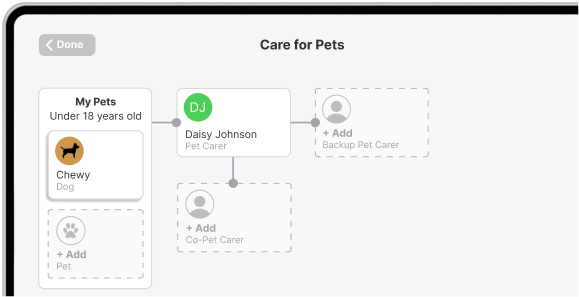
4. Decide who inherits your Residual Estate
Your residuary estate—the portion of your estate that remains after specific gifts and expenses have been distributed—is an important part of your will. You can choose one or more beneficiaries, such as family members, friends, or charitable organizations, to receive these remaining assets. Be sure to clearly list their full legal names and specify the exact proportion or percentage each should receive to avoid any confusion during probate.
It’s best practice to name backup beneficiaries in your will. This ensures that if your primary beneficiary cannot or does not wish to accept the inheritance, your assets will still be distributed according to your wishes. Clearly listing alternate beneficiaries helps prevent delays and potential disputes during probate.

5. Gifting Specific Items
If you have specific items—such as family heirlooms, jewelry, properties, or cash—that you wish to leave to certain individuals, you can designate these in your will. Be as detailed as possible when describing these items to avoid any confusion or disputes later. Include detailed descriptions, such as serial numbers, appraisals, or distinguishing features, to clearly identify each item. It’s advisable to create a comprehensive inventory of your assets before drafting your will. This specificity helps prevent potential disputes among beneficiaries during the probate process.

6. Any Additional Instructions or Provisions?
It’s optional if you wish to include special instructions, such as how you’d like your funeral to be conducted or instructions to sell an asset. You might also wish make a gift conditional, or leave a fund in trust until beneficiaries reach a certain age.

Review Your Will
Confirming Roles in Your Will
Before finalizing your Will in Texas, it’s essential to confirm that your chosen Executors, Guardians and Pet Carers are willing to undertake their designated roles. This confirmation ensure that each individual is prepared and agrees to fulfill their responsibilities, minimizing potential complications in executing your Will.
It’s best practice to communicate with the people nominated in the roles below, along with their backups that they are agree to take on this responsibility:

Executors
Guardians
Pet Carers
Test Your Will
Before you complete your Will, it’s important you think through your wishes and see if you have planned for different potential scenarios, such as people in your Will passing away before you, or conditions not being met. Online platforms such as Will Hero are designed to make this process easy and visual.
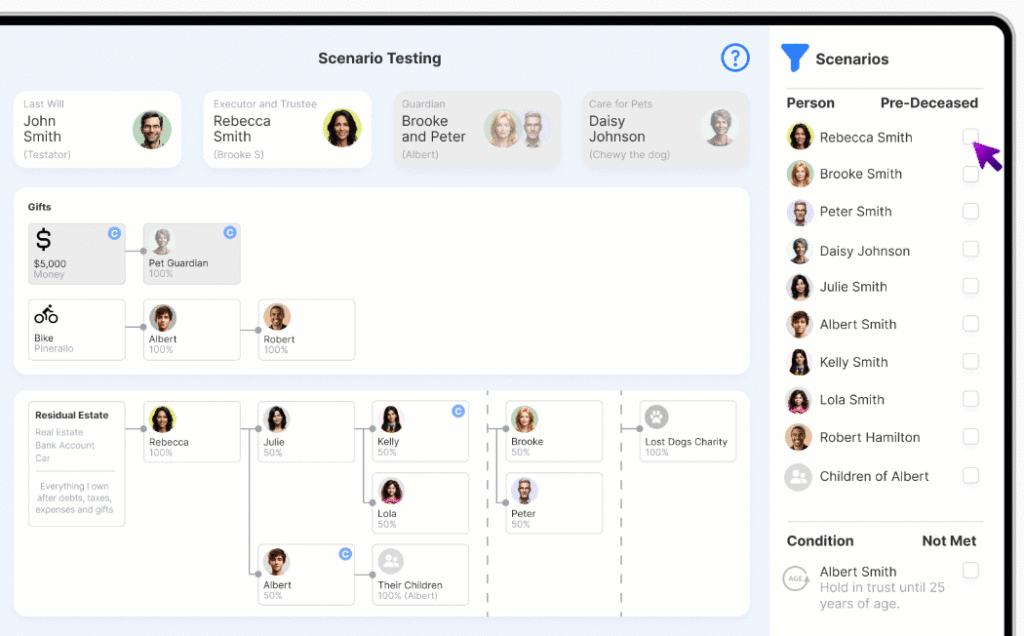
Signing Your Will
Signing Your Will In Front of Witnesses
Once your will is drafted, the next critical step is printing and signing it. In Texas, the signing process must meet specific legal requirements for the will to be valid.
Witness Requirements
In Texas, you must sign your will in the presence of at least two witnesses. These witnesses must:
- Be at least 14 years old (best practice is 18 years old to comply with other States laws).
- Not be named as beneficiaries in the will, to avoid any potential conflict of interest.
- Credible and competent and understand that they are witnessing the signing of your will.
Both witnesses must sign the will after you have signed it, attesting that they were present and that you appeared to be of sound mind when signing.
Witnesses vs Self-Proving Affidavit
While a will does not need to be notarized in Texas to be legally binding, many people choose to include a Self-Proving Affidavit with their will. This affidavit is signed by you and your witnesses in the presence of a notary public, making your will “self-proving.” A self-proving will can expedite the probate process because the court accepts it as authentic without needing the witnesses to testify. However, attaching a Self-Proving Affidavit is optional and not required by law.
Storing Your Will
Keep Your Will Safe
After your will has been signed and witnessed, it’s essential to store the original document in a safe place. In Texas, the legally binding version of your will must be the original signed copy, not a digital version. Losing or damaging this document could cause complications for your loved ones and delay the distribution of your assets.
Here are some options for storing your will securely:
Store at Home
Keep your Will in a safe or locked drawer at home.
With an Attorney
If you worked with a lawyer to create your will, they may offer to store the original document for you in a secure location, such as a fireproof safe or vault.
Trusted Person
You can also leave your will in the care of a trusted family member or friend, making sure they understand the importance of safeguarding the document.
While it’s possible to store documents online for easy reference, please remember that only the original signed document is legally valid. It is best practice to ensure your executor knows where to find the physical copy to avoid any legal complications.
FAQs: Texas Wills
1. What Are My Options for Making a Will in Texas?
In Texas, you have several options for creating a will:
Hiring a Lawyer: If you have a large or complex estate, or if you want personalized legal advice, hiring an attorney may be the best choice. They can help with estate tax planning, setting up trusts, and addressing any specialized needs to ensure your will complies with all legal requirements.
Using an Online Platform: For straightforward estates, platforms like Will Hero provide an affordable and convenient way to create a legally valid will. Our user-friendly interface simplifies the process, guiding you step-by-step to ensure all important aspects are covered.
Handwritten Will (Holographic Will): Texas allows handwritten wills, known as holographic wills, as long as they are entirely in your own handwriting and signed by you. However, these wills can be more easily contested in court due to potential ambiguities or lack of witnesses.
2. Do I Need a Lawyer to Make a Will in Texas?
No, you are not required to hire a lawyer to create a valid will in Texas. If your estate is simple and your wishes are straightforward, you can create a will using an online platform or even a handwritten document. However, if your estate is complex or you have specific concerns about tax planning, trusts, or family dynamics, seeking legal advice may be beneficial to ensure your will is properly drafted and legally sound.
3. Are Handwritten (Holographic) Wills Valid in Texas?
Yes, handwritten wills, also known as holographic wills, are valid in Texas. To be legally binding, the entire will must be written entirely in your own handwriting and must be signed by you. No witnesses are required for a holographic will in Texas. However, these wills are more likely to be contested in court, especially if the instructions are unclear or if there are disputes among beneficiaries. For greater security and to reduce the risk of legal complications, a typed will with witness signatures is recommended.
4. How Much Is the Inheritance Tax in Texas?
Texas does not impose a state inheritance tax. That means that heirs and beneficiaries do not have to pay state taxes on the property or assets they inherit from a descendent who was a Texas resident. However, the federal estate tax may apply to estates exceeding the federal exemption threshold, which is currently $12.92 million (as of 2023). Estates valued below this threshold will not owe federal estate taxes. If your estate is larger than the federal limit, it may be subject to federal taxes. It’s important to consult a tax professional or an attorney if you’re concerned about estate taxes.
5. Do I Need to Notarize My Will in Texas?
No, Texas does not require wills to be notarized to be legally valid. However, you must have at least two witnesses who are present when you sign your will, and these witnesses must also sign the will. While notarizing your will isn’t required, you can attach a self-proving affidavit. This affidavit is signed by you and your witnesses in the presence of a notary public, making your will “self-proving.” A self-proving will can expedite the probate process, as the court can accept the will without needing the witnesses to testify.
6. Can I Change My Will After It’s Signed?
Yes, you can change or update your will at any time, as long as you are of sound mind. There are two main ways to do this:
Add a Codicil: A codicil is a legal amendment to your existing will. It must be signed and witnessed in the same way as your original will. Codicils are suitable for minor changes but can sometimes cause confusion if multiple amendments exist.
Create a New Will: You can draft a new will to replace your old one. Be sure to explicitly state in the new document that it revokes all prior wills and codicils. After signing the new will, destroy all copies of the old one to avoid any confusion or disputes.
7. What Happens if I die without a Will in Texas?
If you die without a will in Texas, your estate will be distributed according to the state’s intestate succession laws. This means your assets will go to your closest relatives, as determined by law, which may not align with your wishes. If you have no close relatives, the state may take possession of your property. Additionally, if you have minor children, the court will decide who will become their guardian, which may not reflect your preferences. Having a will allows you to control these important decisions and ensure your assets and loved ones are cared for according to your wishes.
8. What is Probate?
Probate is the legal process that takes place after someone dies to validate their will and oversee the distribution of their estate according to their wishes (or according to state law if there’s no will).
In Texas, probate generally involves the following steps:
Filing the Will: The will must be filed with the local probate court, along with a petition to open probate. If there’s no will, a petition for intestate succession is filed instead.
Appointment of an Executor or Administrator: If a will exists, the executor named in the document is appointed to oversee the estate. If no executor is named or there’s no will, the court will appoint an administrator.
Inventory of Assets: The executor is responsible for identifying and valuing the deceased person’s assets, including property, bank accounts, investments, personal belongings, and any debts owed.
Paying Debts and Taxes: Before distributing the estate to beneficiaries, the executor must ensure all outstanding debts, taxes, and expenses are paid. This may include mortgages, credit card bills, medical expenses, and any applicable taxes.
Distribution of the Estate: Once debts and expenses are paid, the remaining assets are distributed to the beneficiaries named in the will or, if there’s no will, according to Texas intestate succession laws.
Closing the Estate: After the assets have been distributed and all obligations are met, the executor files a final report with the court to close the probate process.
9. How Long Does Probate Take?
The probate process in Texas can take anywhere from several months to a few years. The duration depends on factors such as the complexity of the estate, the completeness of records, any disputes among beneficiaries, and whether or not the will is contested. On average, probate takes about 6 to 12 months to complete. Working with an experienced probate attorney can help streamline the process and address any challenges that arise.
10. Can Probate Be Avoided?
Some assets can bypass probate through mechanisms like:
Joint Ownership with Right of Survivorship: Property held in joint tenancy automatically passes to the surviving owner upon death, without going through probate.
Beneficiary Designations: Assets like life insurance policies, retirement accounts, and payable-on-death (POD) or transfer-on-death (TOD) accounts with designated beneficiaries transfer directly to those beneficiaries, avoiding probate.
Living Trusts: A living trust allows you to transfer ownership of your assets into the trust while you’re alive. The trust then holds those assets for your benefit during your lifetime and transfers them to your designated beneficiaries after your death. Since the assets are owned by the trust, not by you personally, they don’t need to go through probate. It’s important to ensure that your assets, such as real estate, bank accounts, and investments, are properly transferred into the trust for this benefit to apply.
For many people, setting up a living trust or ensuring proper beneficiary designations can help streamline the estate process and avoid the time and costs associated with probate. Consulting with an estate planning attorney can help you determine the best strategies for your situation.
Ready to Start your Will?
For many, just getting started is the hardest part. If you need to help taking the first step then why not try Will Hero? It’s free to get started and draft a Will visually, see and understand what you want your wishes to be, become educated about Wills and estate planning with guides and our AI Assistant. You can also test your Will under different potential circumstances with a free account using Scenario Testing. Only when you are happy with your Will and wish to review the written document is an Upgrade required. Will Hero is on a quest to make Will creation more visual, interactive and even fun, as opposed to difficult and daunting.
However you wish to make your Will, get started today and protect your loved ones and your legacy.
